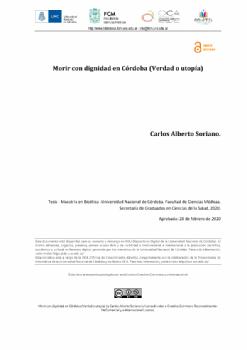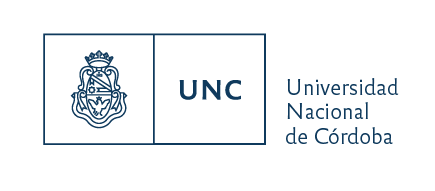| dc.contributor.advisor | Fonti, Diego | |
| dc.contributor.author | Soriano, Carlos | |
| dc.date.accessioned | 2022-05-11T20:48:23Z | |
| dc.date.issued | 2020-02-28 | |
| dc.identifier.uri | http://hdl.handle.net/11086/24813 | |
| dc.description | Tesis - Maestría en Bioética -Universidad Nacional de Córdoba. Facultad de Ciencias Médicas. Secretaría de Graduados en Ciencias de la Salud, 2020 | es |
| dc.description | 68 p. | |
| dc.description.abstract | En esta tesis se indaga en un problema bioético preocupante en la actualidad, que son los numerosos casos de muerte indigna y encarnizamiento terapéutico que se dan con pacientes en estado terminal, o en situaciones de enfermedades irreversibles y/o incurables que le estén ocasionando al paciente una muerte indigna. En este sentido, la investigación se orienta a partir de la pregunta de si la comunidad médica tiene los conocimientos y los criterios adecuados para garantizar la muerte digna a los pacientes, partiendo del supuesto de que los médicos que toman las llamadas “decisiones médicas al final de la vida” son los que más inciden en el cumplimiento del derecho a la dignidad que exige toda persona al momento de su muerte. Para ello, se toman como datos encuestas realizadas a numerosos médicos de la ciudad de Córdoba, así como análisis de casos relevantes de muerte indigna ocurridos en la ciudad. Lo que los datos señalan es que existe un conocimiento erróneo o al menos incompleto por gran parte de los profesionales de salud en lo que respecta a la legislación pertinente y a la bioética. Por esto, todavía en la actualidad el encarnizamiento terapéutico sigue siendo una problemática cotidiana en el tratamiento de los pacientes de UTI, por lo que, a pesar de las leyes vigentes que protegen los derechos de los pacientes, la muerte indigna está siempre presente. Finalmente, esta investigación permite concluir que es fundamental avanzar en la difusión, en profesionales de la salud, pacientes y familiares, de las leyes y los derechos pertinentes para las decisiones médicas al final de la vida, por lo que se plantean algunas recomendaciones derivadas de esta investigación y la experiencia en el trato con pacientes en las situaciones antedichas, orientadas siempre a asegurar al paciente una muerte acompañada cuando ya no hay nada más que tratar. | es |
| dc.description.abstract | This thesis researches a current and worrying bioethical problem today, which are the numerous cases of unworthy death and therapeutic obstinacy that occur with patients in terminal state, at their final stages or in situations of irreversible and / or incurable diseases that are causing an unworthy death to the patient. In this sense, the research is based upon a question that inquires the specific knowledge and criteria among the medical community to guarantee dignified death to patients, based on the assumption that doctors who make the so-called “medical decisions at the end of life ”are the ones that most affect the fulfillment in terms of dignity rights that every person demands at death time. In order to accomplish this hypothesis, surveys were carried out in a large group of physicians in the city of Córdoba, as well as an analysis of some relevant cases of undignified death that occurred in the city. The data indicates an erroneous or at least incomplete knowledge on part of the team of health professionals regarding to the pertinent and specific legislation as well as in bioethics. Therefore still nowadays medical obstinacy is a current problem in treating patiens in ICU. In spite of the existence of legislation which protects patients rights, there are still cases of death without dignity. Finally, this research allows to draw the conclusion that it is fundamental to advance in communicating to health professionals, patients and relatives, about laws and due rights regarding medical decisions at the end of life. In this regards a set
of recommendations ,which result from this research, and from the experience of dealing with patients in terminal state or situ.ations as described above, are offered in order to guide and guarantee accompanying during the death process to patiens with dignity, when there is no further treatment. | en |
| dc.language.iso | spa | es |
| dc.rights | Atribución-NoComercial-CompartirIgual 4.0 Internacional | * |
| dc.rights.uri | http://creativecommons.org/licenses/by-nc-sa/4.0/ | * |
| dc.subject | Derecho a morir | es |
| dc.subject | Discusiones bioéticas | es |
| dc.subject | Derechos del paciente | es |
| dc.subject | Bioética | es |
| dc.title | Morir con dignidad en Córdoba: (Verdad o utopía) | es |
| dc.type | masterThesis | es |
| dc.description.embargo | 2022-05-28 | |
| dc.description.fil | Fil: Soriano, Carlos Alberto. Universidad Nacional de Córdoba. Facultad de Ciencias Médicas. Secretaría de Graduados en Ciencias de la Salud; Argentina. | es |





